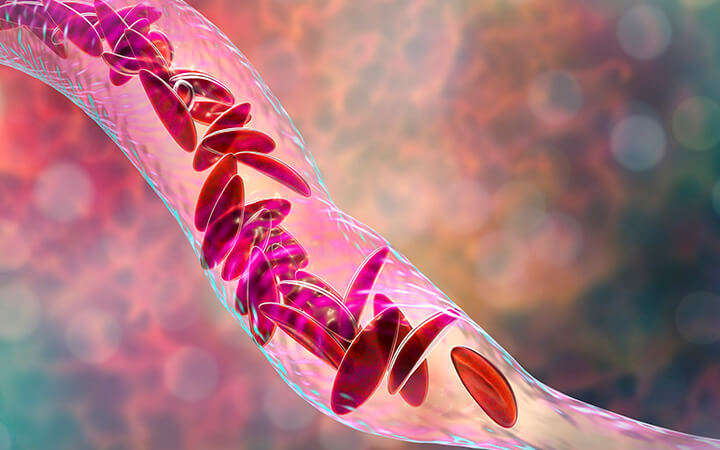The Invisible Toll of Living with Sickle Cell Disease
June 17, 2022
 University Hospitals Rainbow Babies & Children'sExperts in Children's Health
University Hospitals Rainbow Babies & Children'sExperts in Children's Health

People living with sickle cell disease face a host of daunting physical challenges that affect their quality of life. They frequently experience anxiety and depression from the disease, as well as episodes of extreme pain that often results in hospitalization.
“The pain episodes are very unpredictable,” says Amma Owusu-Ansah, MD, director of the pediatric Sickle Cell Anemia Center at University Hospitals Rainbow Babies & Children’s Hospital.
“For people living with sickle cell disease, it can be difficult to make plans because they are unsure when they may experience pain and be hospitalized,” says Dr. Owusu-Ansah. “Anxiety and depression are common in sickle cell disease.”
Sickle cell disease is a group of inherited red blood cell disorders caused by a gene mutation that alters hemoglobin, a protein inside red blood cells. The abnormal hemoglobin gives red blood cells a sickle or crescent shape. The odd-shaped cells are inflexible and become trapped in small blood vessels, impeding the flow of oxygen-rich blood to tissues and causing pain.
The disease affects an estimated 100,000 people, predominantly of African descent, in the United States. It also affects people with Hispanic, southern European, Middle Eastern and Asian Indian backgrounds.
Children and adults with sickle cell disease can suffer from anemia, infections, organ damage including but not limited to stroke, reduced kidney function, vision loss and pulmonary hypertension.
Mental Health Impacts of Sickle Cell Disease
The effects of living with sickle cell disease on mental health and well-being requires early recognition and intervention. A 2018 study found the prevalence of mental health disorders in hospitalized sickle cell patents was on the rise and approached 16 percent overall.
Dr. Owusu-Ansah says common causes of psychological distress include:
- Frequent hospitalizations
- Missing school and work
- Learning difficulties
- Social isolation
- Family stress: The disease affects entire families. Parents often must take time off of work and some lose their jobs, causing economic hardship.
- Teasing or bullying: Many kids with sickle cell disease are small for their age and have other physical differences from peers.
Finding a Better Quality of Life
People with sickle cell disease sometimes face delays in receiving treatment for pain or are not treated adequately. “At times, there may be stigmatization and apparent misunderstanding of sickle cell pain by healthcare providers,” Dr. Owusu-Ansah says. “Because of repeated visits due to pain, individuals seeking medical care may be labelled ‘frequent flyers’ or opioid-seeking.”
UH Rainbow pediatric clinical psychologist Jennifer Giesel, PhD, says sleep disorders and chronic fatigue among kids with sickle cell disease also contribute to depression. Many young people feel despair because the disease prevents them from participating in activities and achieving their goals.
“Many young people who live with sickle cell disease have important life and career goals and are met with challenges that the general population doesn't have to cope with,” she says. “There are significant hurdles, but we like to help our patients identify their individual strengths and empower them to meet realistic goals that may be important to them.”
Dr. Giesel helps children with sickle cell disease cope with pain and other difficulties. She says that social and emotional supports can help reduce the severity of pain. Interventions may include psychotherapy, biofeedback and relaxation techniques.
“The message is that we can manage sickle cell disease from many different angles,” Dr. Giesel says. “People living with sickle cell disease and their families may face many challenges; however, with the right care they can rise above them and live their best lives, not defined by the disease.”
Related Links
The specialists at University Hospitals provide treatment and long-term health management for children and adults with all types of sickle cell disease. Since 1989, we have participated in national research projects for children and adults to ensure our patients are on the leading edge of sickle cell disease care.


